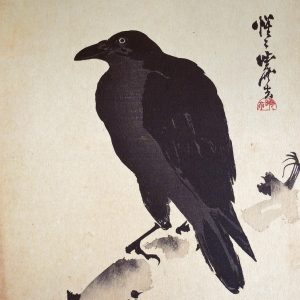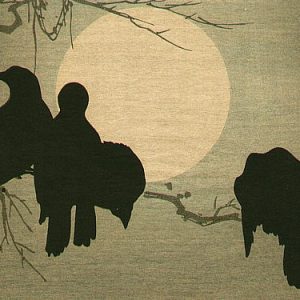
The Courier of the nagal
This then brings us to the nagal’s Courier, a man whose predilection is most aptly for jewel 20, namely, honour, for realise that at the end of the day it is honour that is to be found at the core of any warrior’s heart. Yet, as we have discussed many times before, the warrior’s sense of honour is very different to that of the average man or woman. True honour is the product of the relationship between humility and understanding (2) and absolute freedom (0).
Although we have already dealt with both of these two jewels, namely, 2 and 0, it will benefit the reader greatly if we expand a bit more here on the deeper implications of that mysterious jewel which has no number, for although we assign the number zero to this jewel, the implications are that it is nothing, that is, No-Thing.
From the above it is immediately clear that to try to do justice to jewel 0 in this book is well-nigh impossible, for if the truth be told, many volumes can be devoted to just this one jewel alone, and still the reader will more than likely feel none the wiser, for how does one explain that which by its very nature is no-thing Therefore let it suffice for our present purposes merely to say that jewel 0, because it is no-thing, is the origin of all the jewels, as well as permeating them all. Like its progenitor, the spirit of man, the nagal, jewel 0 is the void containing every-thing, for as paradoxical as it may sound, the void is the ultimate in awareness, for within that void the nature, the meaning, and the purpose of all, stands revealed in the eternal now. From within the void, that is, from within that aspect of awareness to which no number is assigned, there are no questions, for there is no-thing to understand. Likewise, from within the void, there is no freedom, for there is no-thing from which to be free, and hence is it referred to as absolute freedom. Yet care should be taken not to take these statements at face value, for no-thing does not imply emptiness. The fact that the void is no-thing simply implies that it is not that which we can verbalise, for in essence it is the ineffable, the Unspeakable.
From what we have learned here, it should be clear that true honour is the product of the relationship between humility and understanding (2) and the void (0). The implications here are so vast that verbalisation is exceedingly difficult, but it will help to think of it in terms of what were probably the most profound words ever spoken by the philosopher Socrates when he said, “I am the wisest man in the whole world, for I alone know that I know nothing”.
In this truly brilliant statement, Socrates tried his level best to verbalise the true nature of honour, and to the Toltec warrior who is thoroughly versed in the properties of words, those few words do indeed speak volumes. However, it takes a fair amount of explaining in order to qualify the nuances of these words and, in this respect, I personally have always been enormously envious of Socrates, for although those who are fully trained in the properties of words can verbalise anything that needs to be verbalised, the problem is that apprentices never come to the Warrior’s Path already literate. However, to judge from the teachings of Socrates, his students were all fully literate when they came to him!
Nevertheless, realise that the overall import of this statement by Socrates is very much a statement of humility, in that Socrates understood enough about life to know that, relative to the greater life of which we are units, none of us knows much at all. It is only the ignorant fool living in the tiny cocoon of his view of the world who tends to think that his rational mind can provide the answers to everything. Therefore when Socrates said that he knows that he knows nothing, he was in fact stepping back to lower his head in utter humility, for he was fully willing to admit that even all of his wisdom as a philosopher was as nothing in comparison to all that he still did not know. To have such understanding that it automatically brings about humility, in itself already indicates the truly wise man.
Furthermore, in making reference to himself as “I alone”, Socrates was referring to I, the all-one, meaning the totality of the self, and in saying that “I alone know”, he was actually saying “I, the all-one know”. It stands to reason that the only real knowledge there can be, is knowledge of the self, that is, knowledge of the totality of the self – the all-one – and when that knowledge is fully conscious, one can indeed say “I, the allone know”, or alternatively, “I know the all-one (which is me)”. However, Socrates is not merely indicating that he knows the totality of the self, for he goes on to say “I alone know that”, meaning “I, the all-one know that”. What is that} Socrates himself answers this by saying “nothing”, meaning no-thing, that aspect of awareness termed the void. However, he stresses the fact that this knowledge of the void is conscious, for he prefaces the answer with “I know (nothing)”. In other words, what in effect Socrates is saying here, is “I know myself as the allone who knows that termed no-thing, but I am fully conscious of what I know”.
With such a knowledge, and with the humility that comes with the fall understanding of what it is he does know, Socrates has every right to proclaim himself a wise man. Furthermore, since he places his wisdom firmly in perspective by saying “the whole world”, meaning that he grasps fall well that there is only one life, and therefore also only one totality of the self, he is indeed the wisest man, for only the wisest of the wise have the honour necessary not to try claiming knowledge for the personal self.
Therefore in this one brilliant statement, Socrates not only describes the relationship between individual identity, the totality of the self and the void, but he also very neatly defines the true meaning of honour within the context of the interrelationship of the one life. This is about the best I can do to impart at least some feeling for what is implied by honour. If I were to describe it in a nutshell, I would say that true honour is that humility which overcomes a warrior in the moment when he or she comes to understand the deeper implications of what it is to be absolutely free. To know oneself to be one with all selves, good, bad and indifferent, is to understand the meaning of what it is to be humbled, and to stand free from the need to judge, and to stand free from being judged, is true freedom. In that absolute freedom there is no-thing other than an utter sense of beingness, and, in the final analysis, what else can honour be but beingness*
When the nagal and his Courier co-operate intelligently the result is:
18 + 20 = 11.
In other words, the relationship between the nagal and his Courier brings forth strength, a quality which both of them need in the fulfilment of their respective duties. From what we have already learned about numerology, it is clear that the strength referred to here is in reality the sum of impeccability and pure fluidity. The implications here are vast, but let it suffice to say that because, in an esoteric sense, the nagal represents the nagal, that is, the spirit of man, and because of the nature of his duties, the nagal is often required to act with an utter fluidity that has not yet been tried and tested within life upon the physical plane. This, of course, amounts to having to improvise in the moment and, as a result, the nagal often finds himself walking a very fine line indeed between leading others to freedom and being a complete fool. Naturally, in his close association with the nagal, the nagal’s Courier runs a very similar risk, as indeed does the nagal woman, for the result of intelligent co-operation between these three beings is still strength:
18 + 20 + 9 = 11.
Thèun Mares
The Mist of Dragon Lore.
